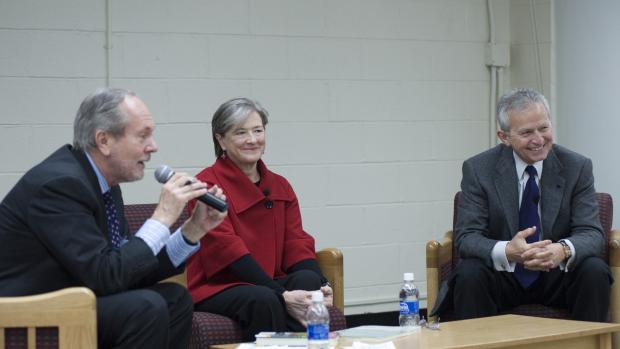Area Visionaries Gather for 4th Annual Leadership Forum and Innovation Think Tank

Polytechnic Institute of NYU hosted its 4th Annual Leadership Forum and Innovation Think Tank, an annual gathering of downtown Brooklyn and New York City visionaries, on the morning of Friday, March 12. Policymakers, faculty, and participants of NYU-Poly’s business incubators joined leaders from the private, public, and nonprofit sectors to discuss the future of the regional, national, and global economy and its impact on students. Over coffee and breakfast, NYU-Poly President Jerry Hultin guided a conversation featuring Kathryn Wylde, president and CEO of the nonprofit Partnership for New York City, and Nicholas Donofrio, senior fellow at the Ewing Marion Kauffman Foundation, IBM fellow emeritus, and IBM executive vice president of technology and innovation (retired).
Provost Dianne Rekow welcomed the standing-room-only audience with impressive NYU-Poly news that set the stage for the forum’s economic and education focus: undergraduate and graduate enrollment was up again for the 2009-2010 academic year; the business incubator program assisted 54 start-ups, creating more than 120 new jobs; and the inaugural Think Tank, which tasks multidisciplinary faculty research teams with real-world problems facing industry partners, launched in January.
[GALLERY:3104|left]
Provost Rekow then introduced President Hultin who began by recalling demographers’ forecast: by 2040 there will be no majority race in America. If that’s the case, he said, then NYU-Poly, with the diversity among its students and instructors, is living in the future. The multiplicity of viewpoints “gives us a great edge,” he said, “but what do we do with that?”
Continuing, he highlighted the relationship between higher education and the K-12 grades. That theme was returned to throughout the morning, as was the topic of economic development and its effects on graduates’ future. Considering students’ options and marketplace trends, President Hultin turned to Wylde with the blunt question, “What’s hot?”
“Brooklyn, obviously,” she replied, receiving an appreciative laugh from the audience. More seriously, Wylde described academia’s transformation from “an anti-commercial culture” to one far more open to business. “Institutions have really understood the opportunity we have in New York,” she said. “Our major industries — finance, media, and medicine — are all first adopters of what’s new.”
NYU-Poly’s emphasis on innovation, invention, and entrepreneurship (its “i-squared-e” philosophy) wasn’t lost on Wylde, as she commended the Institute for becoming a center for “practice, academia, business, start-ups, and the venture community.”
Acting locally, thinking globally
The conversation’s focus shifted when President Hultin drew Donofrio’s attention to the national and international. According to Donofrio, the country’s higher education system still operates on a 19th-century model. America’s global competitors are working from the same outmoded system, he believes, but change is afoot. “You can rest assured that China is thinking about it, that India is thinking about it, that the continent of Africa is thinking about it,” Donofrio said as he went on to list other world regions and their pursuit of educational goals that more closely align with workplaces of the future in increasingly service- and information-based economies.
Such environments are likely to consist of “people who are much more collaborative, who are much more global in their thinking,” he said. “T-shaped” workers, Donofrio called them. They have a principal skill, such as electrical engineering, that forms the vertical spine of the T, but other interests and skills — a background in anthropology, for instance — round out such workers to create the horizontal bar of the T. Their broadened viewpoints expand what would otherwise be a narrow approach.
As the discussion similarly opened up to include guests, Randy Asher, principal of Brooklyn Technical High School, described how students were arriving at his school with a stronger technical skill base than they had shown in the past, a change that has had his teachers struggling to keep up. “We have to continually train our professionals to meet needs as they’re changing,” he said, expressing the anxiety that comes with preparing students “for companies that don’t yet exist.”
Teaching and taxes
NYU-Poly’s local outreach to promote student and teacher skills in STEM — science, technology, engineering, and mathematics — subjects alleviates some of his concerns, Asher said. In particular, he noted robotics programs like FIRST LEGO League, which is made possible by funding partners such as the Brooklyn Community Foundation.
Bob Bonelli, president of Northeast Securities, himself a graduate of Brooklyn Tech and Polytechnic, suggested instructors should also prepare students by teaching better communication skills at all academic levels. Engineers, mathematicians, and scientists who can translate their ideas are guaranteed success, he said. Bonelli assured the audience that “the money is just sitting there” for technologists who can confidently demonstrate the commercial viability of their work.
The state’s coffers don’t enjoy the same status, a fact NY State Assemblyman Hakeem Jeffries reminded attendees. He described how Wall Street traditionally provided New York State with 20 percent of its tax revenue but how the recent financial crisis, coupled with the hit suffered by New York City’s formerly robust real estate market, dried that income stream. The STEM fields are where policymakers should refocus, Jeffries said.
Wylde agreed. “The only solution as a city and as a state is to be much more deliberate about how we grow our private sector economies,” she said.
Her comment brought the discussion full circle, reminding the audience of Provost Rekow’s opening remarks about the success NYU-Poly business incubators have had developing new companies and new jobs. Although serious challenges exist, Ralph Alexander, chair of the Institute’s board of trustees, expressed confidence in NYU-Poly’s community and vision and invited audience members to continue collaborating.




